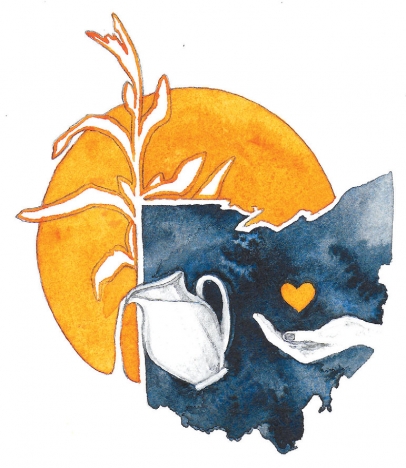A Shared Food Ethic
After a decade in the Ohio local, sustainable food movement, my greatest satisfaction and pleasure comes from the wonderful friendships and working relationships that have developed over the years. Reflecting on the many events and interactions pulls on the deepest, strongest and sweetest emotions. All of us drink from this well when we find ourselves parched by the realities of what my wife and business partner, Victoria, refers to as our “unintentional nonprofit.” When local food entrepreneurs get together and let our hair down, we all laugh about the regular congratulations on our perceived success, the importance of faking it until you maybe can make it and the need to never quit, no matter how difficult, no matter how narrow or nonexistent the profit margin may be, nor how little time we do have to share with our family and friends.
Our Athens area local food movement is more than three decades old, so trying to list even half of the current players is unreasonable. Perhaps just mentioning Shagbark Seed and Mill and its founders, Michelle Ajamian and Brandon Jaeger, is a good example. Michelle has, for decades, been an active participant and leader in the community on a range of social and environmental issues. She and her partner, Brandon, have envisioned, planned and executed a multi-year strategy that has their products now sold across a multi-state region. Shagbark’s strategy is unique and audacious recognition of the need for stable, traditional food basics.
Neither of our businesses could have succeeded without the foundation of the three-decades-old commitment to local, sustainable food procurement, birthed by the visionary hippie founders of the Casa Nueva restaurant, and the community support of one of the largest and most successful farm markets in the nation.
Athens has a century-old tradition of intentional communities based on fundamental human ethics, including treating other people as you would wish to be treated yourself, taking responsibility to help others in need, accepting that bounty is for the purpose of sharing and having confidence that attending to everyone’s needs is the best way to attend to one’s own. These ethics are consistent with those of America’s founding fathers.
Today, we find ourselves in a nation now based on every man for himself, take care of number one first, greed is good, dog-eat-dog competition, profit before people and the plunder of nature’s bounty for individual private gain. We see capitalism and supposed free-market ideals leading to predatory monopolies, which prevent local sustainable food enterprises from being economically viable.
In September, the ninth annual Slow Food “Shake the Hand That Feeds You” dinner was held at the Produce Terminal at 4561 E. Fifth Ave. The terminal was built by the City of Columbus in 1963 as infrastructure to support the produce purveyors and the farmers that supplied it. It is ironic that half a century ago government was depended upon to provide public-owned infrastructure in a time when capitalism was broadly embraced as a benevolent economic and social system.
Yet today, Snowville Creamery must deliver to grocery stores ourselves, with the resultant cost to consumers of nearly a dollar per half-gallon. Kroger and Walmart, with their privately owned and controlled distribution networks, can put a gallon jug of milk in hundreds of stores in Ohio for closer to a dime. When these retail groceries embrace working with the local, sustainable food movement at a price point that is equitable and fair, Shagbark and Snowville can be successful.
I propose a next step for local food entrepreneurs in Ohio. For the evolution of our sustainable food system, we need an assembly of a diverse and widespread group of entrepreneurs who have already created the building blocks of this future integrated food system. We need to commit to meet as long as it takes to create this vision and ultimately develop a strategic implementation plan that helps us all meet our goals.
A first attempt at this opportunity occurred about five years ago, when a handful of Columbus food system movers and shakers, including representatives of the farm community, convened to discuss how we could encourage and grow our food system in Central Ohio and beyond. We met monthly for more than a year and a half, and eventually disbanded as we were unable to find funding and support for the necessary distribution infrastructure that we identified as essential to growing our individual food businesses.
The Ohio local, sustainable food community needs to become more close-knit, more politically and economically empowered and better organized if we are to progress past our current level of accomplishment. The wonderful news is that we have a mature, strong, committed food community—scores of entrepreneurs who have proven mettle—spread all over Ohio. What we have not had is the time, focus or relentless commitment to morphing all of us into an interconnected, interdependent, efficient, effective, resilient and flexible functioning food system.
The industrial food system succeeded in accomplishing that decades ago and continues to invest great time and resources in strengthening, growing and refining their systems. They do this purely in the pursuit of profit, and their cohesive and consistent pursuit of that goal, as a common purpose, unites them as much as any group of religious fanatics. It justifies the bullyism of monopoly, the cruelty of lower-than-living wages and the acceptance, even promotion, of food that makes us sick—children and adults alike.
Shagbark Seed and Mill and Snowville Creamery have been working together on distribution for nearly two years. Since we both sell our products to many of the same stores, and Snowville Creamery was already delivering to those stores, Snowville now delivers Shagbark Seed and Mill products along with our milk. Snowville trucks also pick-up Shagbark’s products in Athens, and transfer them up to Snowville’s Columbus distribution center. This provides additional warehousing, and an inventory of Shagbark for the Columbus market. There is even another step in this distribution chain as Snowville delivers Shagbark products to the Green BEAN/Tiny Footprint warehouse in Columbus for their distribution to other retail stores.
Let’s begin the discussion together of how we are going to express our values and create a food system here in Ohio that reflects these values. In the spring issue we will consider in more detail the short-term actions that the food entrepreneurial community can take in 2017, so we are farther along by this time next year.






